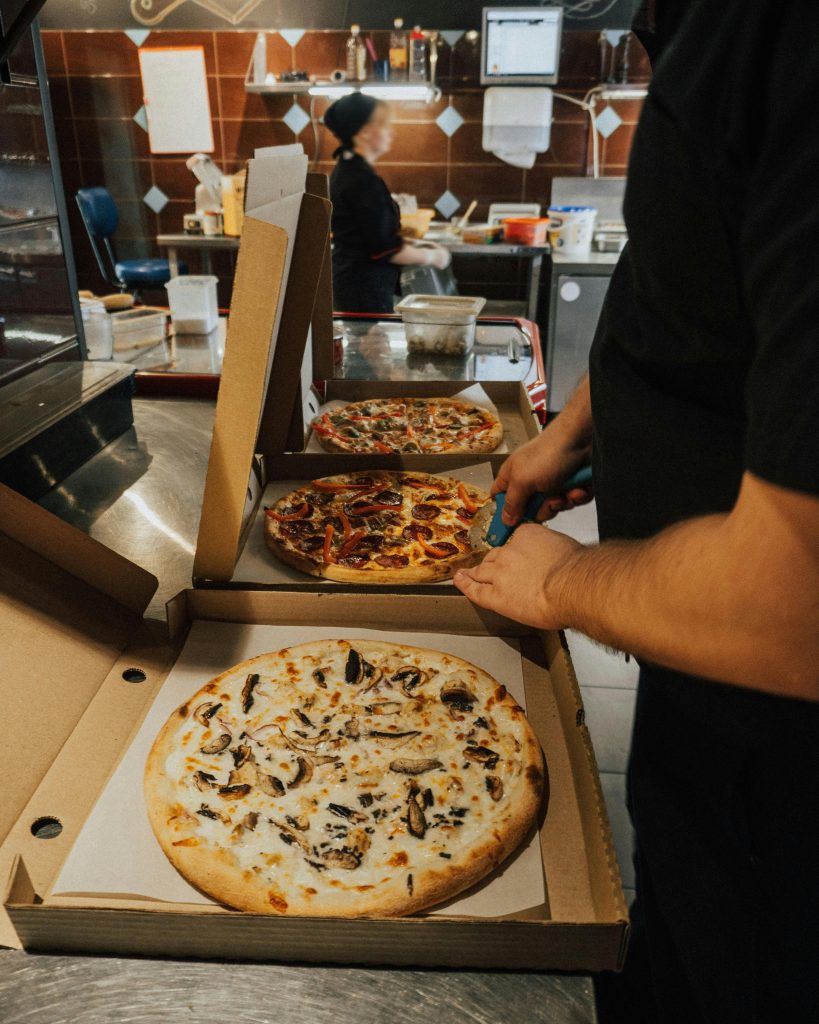Napoleon Needs You in the Kitchen! Finding Line Cook Jobs in Our Town

Napoleon, Ohio might be known for its charming small-town feel, but its restaurant scene is cooking up something special! If you’re a skilled and passionate line cook looking for your next opportunity, our community has restaurants eager to welcome you to their kitchens. Let’s explore how you can find line cook jobs right here in Napoleon.
Why Napoleon Could Be Your Next Culinary Home:
- A Growing Food Scene: While maintaining its friendly atmosphere, Napoleon boasts a variety of restaurants, from local favorites to more diverse cuisines, offering different culinary experiences.
- Community Focus: Working in a smaller town often means a closer-knit team and a chance to connect with regular customers.
- Cost of Living: Generally, the cost of living in Napoleon and Northwest Ohio can be more affordable than in larger metropolitan areas.
- Opportunities for Growth: As you become a valued member of a kitchen team, there can be opportunities for increased responsibility and advancement.
What Does a Line Cook Do?
For those new to the culinary world or looking to solidify their understanding, a line cook is a crucial part of any restaurant kitchen. You’ll typically be responsible for:
- Preparing and cooking specific menu items according to recipes and standards.
- Working efficiently and quickly on a particular station (e.g., grill, sauté, fry).
- Ensuring food quality, consistency, and presentation.
- Maintaining a clean and organized work station.
- Following food safety and sanitation guidelines.
- Collaborating with other kitchen staff to ensure smooth service.
Where to Find Line Cook Jobs in Napoleon:
Ready to fire up your career in Napoleon? Here are some key places to look for line cook openings:
- Online Job Boards: Websites like Indeed, ZipRecruiter, and even general job sites often list restaurant positions in the Napoleon area. Use keywords like “line cook Napoleon OH” or “restaurant jobs Napoleon OH.”
- Restaurant Websites: If you have a particular restaurant in Napoleon you admire, check their website’s career or “Join Our Team” page.
- Local Classifieds and Community Boards: Keep an eye on local newspapers, community bulletin boards (both physical and online), and social media groups dedicated to Napoleon.
- Networking: Let friends, family, and acquaintances in Napoleon know you’re looking for a line cook position. Word-of-mouth can be a powerful tool.
- Direct Applications: Don’t hesitate to visit restaurants in person during off-peak hours and inquire about job openings. Sometimes, a direct approach can leave a positive impression.
- Highlight Relevant Experience: Even if it’s not strictly “line cook” experience, emphasize any kitchen work, food preparation, or fast-paced work you’ve done.
- Showcase Your Skills: If you have strong knife skills, experience with specific cooking techniques, or knowledge of food safety, make sure to mention it.
- Emphasize Teamwork and Communication: Restaurants thrive on collaboration. Highlight your ability to work well with others and communicate effectively in a busy environment.
- Express Your Passion: A genuine interest in food and the restaurant industry can go a long way.
- Be Prepared for an Interview: Research the restaurant, dress neatly, and be ready to answer questions about your experience, work ethic, and availability.
Napoleon’s kitchens are waiting for talented individuals like you! Take the initiative, explore these avenues, and you could soon be contributing your culinary skills to a thriving local restaurant. Good luck with your job search!

What’s the Job Summary for a Line Cook? Serving Up the Essentials
So, you’re eyeing a career in the bustling heart of a restaurant kitchen? Or perhaps you’re an aspiring chef trying to understand the ranks? One of the most crucial roles you’ll encounter is that of the Line Cook. But what exactly does their day-to-day entail? What’s the core essence of their job? Let’s break down the essential job summary for a line cook.
Think of the line cook as the engine of the kitchen during service. They are the culinary workhorses, expertly executing dishes with speed and precision to ensure every plate that leaves the kitchen meets the restaurant’s standards. Their role is dynamic, demanding, and absolutely vital to a smooth and successful service.
Here’s a breakdown of what a typical job summary for a Line Cook might look like:
Job Title: Line Cook
Summary:
The Line Cook is responsible for preparing and cooking menu items according to standardized recipes and plating guidelines, ensuring food quality, consistency, and timely delivery during service. This role requires strong culinary skills, the ability to work efficiently in a fast-paced environment, adherence to food safety and sanitation regulations, and effective communication within the kitchen team. The Line Cook reports to the Sous Chef or Head Chef and plays a critical role in maintaining the smooth operation of the kitchen and ensuring guest satisfaction.
Let’s unpack the key components of this summary:
- Preparing and Cooking Menu Items: This is the core of the role. Line cooks are masters of their assigned station (e.g., grill, sauté, fry, pantry). They must be proficient in various cooking techniques and able to follow recipes accurately.
- Standardized Recipes and Plating Guidelines: Consistency is key in a professional kitchen. Line cooks must adhere to the established recipes and plating instructions to ensure every dish is prepared and presented exactly as intended.
- Food Quality and Consistency: Ensuring that the ingredients are fresh, cooked properly, and meet the restaurant’s quality standards is paramount. Consistency in flavor, texture, and appearance is crucial for customer satisfaction.
- Timely Delivery During Service: The ability to work quickly and efficiently under pressure is essential. Line cooks must be able to manage their time effectively to ensure dishes are ready when needed, contributing to a smooth flow of service.
- Fast-Paced Environment: Restaurant kitchens, especially during peak hours, are high-energy and demanding. Line cooks need to thrive in this environment, maintaining focus and composure while working quickly.
- Food Safety and Sanitation Regulations: Adherence to strict hygiene and food safety standards is non-negotiable. Line cooks are responsible for maintaining a clean workstation, handling food properly, and following all safety protocols.
- Effective Communication Within the Kitchen Team: Clear and concise communication with chefs, other cooks, and service staff is vital for a well-coordinated kitchen.
- Reports to Sous Chef or Head Chef: Line cooks receive direction and guidance from the senior culinary team and are responsible for executing their instructions.
- Critical Role in Maintaining Smooth Operation and Guest Satisfaction: Ultimately, the work of the line cook directly impacts the efficiency of the kitchen and the overall dining experience of the guests. Their skill and dedication are crucial to the restaurant’s success.
Beyond the Summary: What Makes a Great Line Cook?
While the job summary outlines the essential responsibilities, a truly exceptional line cook possesses additional qualities:
- Passion for Food: A genuine interest in cooking and a desire to learn and improve.
- Attention to Detail: Ensuring accuracy in measurements, cooking times, and plating.
- Organization Skills: Keeping their station clean, organized, and well-stocked.
- Resilience: The ability to handle pressure and bounce back from setbacks.
- Positive Attitude: Contributing to a positive and collaborative kitchen environment.
The job summary for a line cook paints a picture of a skilled, efficient, and crucial member of the restaurant team. They are the backbone of the kitchen during service, responsible for bringing the chef’s vision to life on every plate. If you’re looking for a hands-on, fast-paced, and rewarding career in the culinary world, the role of a line cook is an excellent place to start and build your foundation. So, if you’re ready to turn up the heat and contribute your culinary talents, the line awaits!

Do You Have to Know How to Cook to Be a Line Cook? Serving Up the Truth
So, you’re intrigued by the fast-paced world of restaurant kitchens, the sizzle of the grill, and the symphony of clanging pans. Maybe the role of a line cook has caught your eye. But a nagging question lingers: do you actually need to know how to cook to land this gig?
The short answer, with a sprinkle of nuance, is yes, absolutely, you need to know how to cook to be a line cook.
While the entry-level nature of some kitchen positions might lead you to believe otherwise, the core function of a line cook is precisely that: cooking food. They are the individuals stationed at specific areas of the “line” in the kitchen (grill, sauté, fry, pantry, etc.), responsible for preparing and cooking menu items according to the restaurant’s recipes and standards.
Think of it this way: a surgeon needs to know anatomy, a carpenter needs to know how to use tools, and a line cook needs to know how to cook. It’s fundamental to the role.
Here’s why knowing how to cook is non-negotiable for a line cook:
- Executing Recipes: Line cooks are the hands that bring the chef’s vision to life. They must be able to read and accurately follow recipes, understanding measurements, cooking times, and techniques.
- Operating Equipment: From grills and fryers to ovens and sauté pans, line cooks need to be comfortable and proficient in using various kitchen equipment safely and effectively.
- Understanding Basic Cooking Techniques: Knowing the difference between searing, sautéing, grilling, and braising isn’t just fancy terminology – it’s essential for preparing food correctly and achieving the desired results.
- Ensuring Food Quality and Consistency: Line cooks are the last line of defense before a dish reaches the customer. They need to be able to identify if food is cooked properly, seasoned correctly, and meets the restaurant’s quality standards consistently.
- Working Under Pressure: The kitchen line during service can be intense. Knowing how to cook efficiently and quickly is crucial for keeping up with orders and ensuring timely delivery of food.
- Maintaining Food Safety: A fundamental aspect of cooking in a professional kitchen is understanding and adhering to food safety regulations. Line cooks need to know how to handle, store, and cook food safely to prevent foodborne illnesses.
Can You Learn on the Job?
While formal culinary education isn’t always a strict requirement for entry-level line cook positions, a foundational understanding of cooking is usually expected. You might start in a more basic role like a prep cook, where you’ll learn essential knife skills, basic food preparation techniques, and kitchen organization. This experience can then pave the way to a line cook position as your skills develop.
Some restaurants may be willing to train individuals with a strong work ethic and a genuine interest in learning to cook, but they will still be looking for a basic aptitude and willingness to learn quickly. You won’t typically be hired as a line cook with zero cooking knowledge and be expected to learn everything from scratch on the busiest service nights.
What Skills are Employers Looking For?
Beyond just “knowing how to cook,” employers look for specific skills in line cook candidates:
- Basic Knife Skills: Being able to chop, dice, and slice efficiently and safely.
- Familiarity with Kitchen Equipment: Knowing how to operate common appliances.
- Understanding of Cooking Temperatures and Techniques: Knowing how to cook different types of food properly.
- Ability to Follow Instructions: Accurately adhering to recipes and chef’s directions.
- Speed and Efficiency: Working quickly and effectively under pressure.
- Organization and Cleanliness: Maintaining a clean and organized workstation.
- Teamwork and Communication: Collaborating effectively with other kitchen staff.
- A Strong Work Ethic and Willingness to Learn.
While you might not need to be a Michelin-star chef to start as a line cook, a fundamental understanding of cooking principles and basic culinary skills is definitely a prerequisite. Think of it as needing to know how to read to write a story. You need the foundational knowledge to execute the tasks effectively.
If you’re passionate about food and eager to work in a dynamic kitchen environment, starting with a strong foundation in cooking – whether through formal training, personal experience, or entry-level kitchen roles – will significantly increase your chances of landing a rewarding line cook job. So, get cooking, hone your skills, and get ready to bring the heat to the kitchen line!